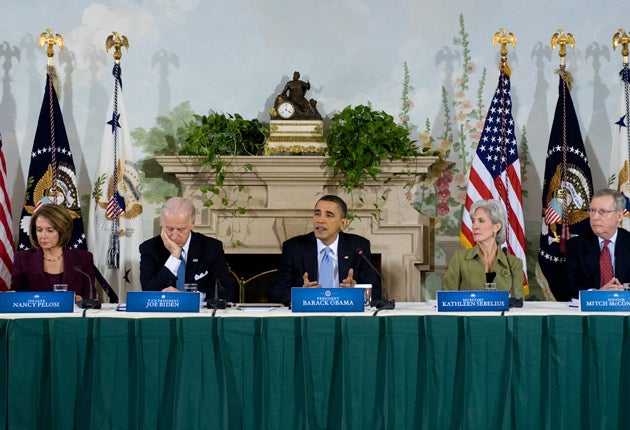Obama's health warning
As hopes of compromise on reform fade at televised bipartisan summit, President hints at political war

Chances of a last-ditch bipartisan deal on US healthcare reform faded yesterday as Republican leaders told Barack Obama to jettison the current Democratic proposals now marooned in Congress and restart the process from scratch.
At an extraordinary public "summit" of the leaders of both parties, the Republicans also warned their opponents not to try to "jam through" reform in the Senate by the use of a controversial procedural device.
In recent days, the White House and Democratic leaders on Capitol Hill have dropped loud hints that, failing agreement, they would resort to the "reconciliation" mechanism that would require only 51 votes for Senate passage, instead of the 60 needed to overturn a Republican filibuster.
"We believe we have better ideas," said Lamar Alexander, Senator and former governor of Tennessee, as he set out the Republicans' case. "We want you to succeed, because if you succeed, the country succeeds. But we want you to change direction on healthcare. This [the current Democratic Bill] is a car that can't be recalled and fixed," Mr Alexander said, urging Mr Obama to come up with a smaller, more incremental measure.
The exchanges grew more pointed. John Kyl of Arizona, the Senate's second-ranking Republican, warned of "fundamental differences" between the parties "that cannot be papered over", while Harry Reid tartly told Mr Alexander that he was entitled to his own opinions, "but not to your own facts".
"I'd like to hope this won't be political theatre, just playing to the cameras," President Obama said as he opened proceedings in Blair House, the government guesthouse just across from the White House. Then he invoked the death of his mother from cancer and the childhood illnesses of his daughters in making his case.
There had already been a spat over whether the table at which the participants sat should be in a U or an O shape. The exchanges thereafter turned into theatre, or, more precisely, a televised boxing match, in which both sides rolled out their most powerful punches.
Yesterday effectively opened the endgame of the healthcare debate that has dominated Washington politics for the last nine months. After hopes of filibuster-proof Senate passage effectively died with the loss in January of Ted Kennedy's seat in Massachusetts, the President on Monday put forward for the first time his own proposals, raising the stakes even higher.
Mr Obama clearly reckons that having invested so much time, energy and political capital in healthcare reform, he cannot abandon the project now. But privately, Democrats and Republicans agree that the Easter recess that starts in early April has become a de facto deadline for a Bill. With November's mid-term elections already on the horizon, both parties are desperate to switch the focus to the economy and jobs, the issues that matter most to voters.
If anything, the Republicans seemed to have the better of the televised argument. The waspish Mitch McConnell, the Senate minority leader who along with Mr Reid and House Speaker Nancy Pelosi has become a symbol of the gridlocked legislative process, adroitly left the early talking to the folksy Mr Alexander. At times, Mr Obama seemed on his own in fending off Republican criticism.
He also appeared irritable as discussions wandered off substantive arguments back to all-too-familiar talking points. But the basic problem remained: how to extend coverage to the 46 million Americans without health insurance, and reduce the costs of a system that consumes 18 per cent of the US economy and threatens to drown the country in debt.
Mr Reid claimed that 750,000 people had been forced into bankruptcy in 2008 by healthcare bills, and that each year 45,000 Americans die because they lack coverage. Oklahoma Republican Tom Coburn – a doctor by training – insisted that 20 per cent of government healthcare spending was fraudulent, and eliminating this fraud could cut costs by 10 per cent or more.
What happens next is unclear. The use of reconciliation in the Senate would infuriate Republicans, and make them even more unwilling to co-operate on healthcare, or anything else. The Bill's fate in the House, where the original proposal passed last year by just five votes, has also become uncertain. Since then, at least two supporters have defected and a third has died.
Join our commenting forum
Join thought-provoking conversations, follow other Independent readers and see their replies
Comments
Bookmark popover
Removed from bookmarks